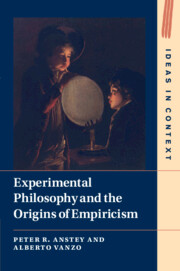Refine search
Actions for selected content:
41 results
Chapter 9 - The Present Plight of Science, and Our Plight
- from Part III - Interventions
-
-
- Book:
- Science and Humanism
- Published online:
- 09 October 2025
- Print publication:
- 23 October 2025, pp 197-215
-
- Chapter
-
- You have access
- Open access
- HTML
- Export citation
Chapter 5 - The Bookish Sensorium
-
- Book:
- How the World Became a Book in Shakespeare's England
- Published online:
- 09 August 2025
- Print publication:
- 14 August 2025, pp 160-190
-
- Chapter
- Export citation
Conclusion
-
- Book:
- A Lesson on Race
- Published online:
- 22 May 2025
- Print publication:
- 05 June 2025, pp 123-127
-
- Chapter
- Export citation
Chapter 2 - Daedalus and Proteus
-
- Book:
- Satire, Instruction and Useful Knowledge in Eighteenth-Century Britain
- Published online:
- 24 April 2025
- Print publication:
- 08 May 2025, pp 29-50
-
- Chapter
-
- You have access
- Open access
- Export citation
8 - Experimental Philosophy
- from Part IV - Spaces of Knowledge
-
- Book:
- Curating the Enlightenment
- Published online:
- 07 December 2024
- Print publication:
- 07 November 2024, pp 243-292
-
- Chapter
- Export citation
4 - Incoherence Brought to Order: Empiricism and the Essay
- from Part I - Forming the British Essay
-
-
- Book:
- The Cambridge History of the British Essay
- Published online:
- 31 October 2024
- Print publication:
- 04 July 2024, pp 48-62
-
- Chapter
- Export citation
2 - Surprised into Form: The Beginnings of the English Essay
- from Part I - Forming the British Essay
-
-
- Book:
- The Cambridge History of the British Essay
- Published online:
- 31 October 2024
- Print publication:
- 04 July 2024, pp 18-31
-
- Chapter
- Export citation
Chapter 1 - A “Metaphorical God” and the Book of Nature
- from Part I - Metaphysical Poets
-
- Book:
- Literature and Natural Theology in Early Modern England
- Published online:
- 07 October 2023
- Print publication:
- 19 October 2023, pp 27-60
-
- Chapter
- Export citation
Chapter 1 - How to Read a Libel in Early Modern England
- from Part I - The Scene of Libel
-
- Book:
- Libels and Theater in Shakespeare's England
- Published online:
- 05 October 2023
- Print publication:
- 19 October 2023, pp 31-57
-
- Chapter
- Export citation
Chapter 2 - “I Summon’d Nature”
- from Part I - Metaphysical Poets
-
- Book:
- Literature and Natural Theology in Early Modern England
- Published online:
- 07 October 2023
- Print publication:
- 19 October 2023, pp 61-83
-
- Chapter
- Export citation
Chapter 1 - Religious Dissimulation and Toleration in Early Modern England
-
- Book:
- Religious Dissimulation and Early Modern Drama
- Published online:
- 31 August 2023
- Print publication:
- 28 September 2023, pp 27-47
-
- Chapter
-
- You have access
- Open access
- HTML
- Export citation
11 - Reaching for Open
- from Part III - The Open
-
- Book:
- The Poverty of Strategy
- Published online:
- 14 July 2023
- Print publication:
- 29 June 2023, pp 337-367
-
- Chapter
- Export citation
5 - Politic History
-
-
- Book:
- Time, History, and Political Thought
- Published online:
- 08 June 2023
- Print publication:
- 22 June 2023, pp 102-135
-
- Chapter
- Export citation
Chapter 6 - ‘As God loves Sympathy, God loves Symphony’
-
- Book:
- Sympathy in Early Modern Literature and Culture
- Published online:
- 27 April 2023
- Print publication:
- 13 April 2023, pp 215-252
-
- Chapter
- Export citation
Chapter 2 - Experimental Philosophy in the Seventeenth Century
- from Part I - The Rise of Experimental Philosophy
-
- Book:
- Experimental Philosophy and the Origins of Empiricism
- Published online:
- 17 February 2023
- Print publication:
- 23 February 2023, pp 43-74
-
- Chapter
- Export citation
Chapter 1 - The Origins of the Experimental/Speculative Distinction
- from Part I - The Rise of Experimental Philosophy
-
- Book:
- Experimental Philosophy and the Origins of Empiricism
- Published online:
- 17 February 2023
- Print publication:
- 23 February 2023, pp 19-42
-
- Chapter
- Export citation

Experimental Philosophy and the Origins of Empiricism
-
- Published online:
- 17 February 2023
- Print publication:
- 23 February 2023
7 - Emergence of Modern Science
- from Part I - Psychology’s Historical Foundations
-
- Book:
- History and Systems of Psychology
- Published online:
- 04 November 2022
- Print publication:
- 17 November 2022, pp 127-146
-
- Chapter
- Export citation
6 - Experimental Science and the Essay
- from Part II - The Work of the Essay
-
-
- Book:
- The Cambridge Companion to The Essay
- Published online:
- 27 October 2022
- Print publication:
- 03 November 2022, pp 97-110
-
- Chapter
- Export citation
1 - Remembering the Essay
- from Part I - Forms of the Essay
-
-
- Book:
- The Cambridge Companion to The Essay
- Published online:
- 27 October 2022
- Print publication:
- 03 November 2022, pp 17-31
-
- Chapter
- Export citation
